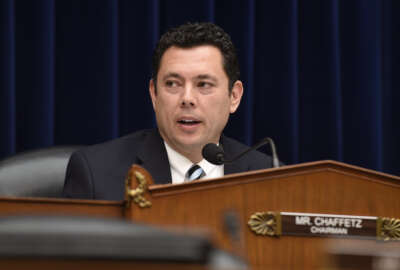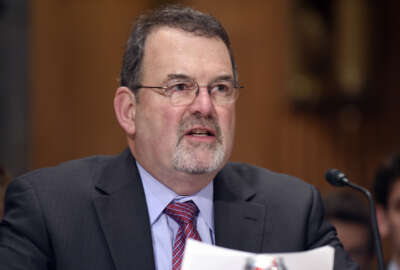
IT Modernization Fund has 50-50 shot of getting passed, oversight experts say
A legislative assistant for Rep. Will Hurd (R-Texas), one of the key players on the House Oversight and Government Reform Committee, said members are warming to the...
With the legislative clock ticking, the fate of the administration’s $3.1 billion IT Modernization Fund is still up in the air, as some members of Congress seem to be discussing other alternatives.
Federal Chief Information Officer Tony Scott once again said he sees “bipartisan support” in Congress for the IT Modernization Act, the bill from House Minority Whip Steny Hoyer (D-Md.) that would fund the administration’s plan to modernize federal technology.
Madison Smith, a legislative assistant for House Oversight and Government Reform IT Subcommittee Chairman Will Hurd (R-Texas), said his boss and other members were “definitely warming” to the idea of the fund. But he also added that Hurd is still “reticent.”
And when asked to rate the likelihood of whether the fund would pass Congress this year, Smith gave it a five out of 10 chance, adding that “there are other proposals being internally discussed and evaluated right now.”
Neither the House nor the Senate included the bill that would create the fund in their appropriations bills.
“That doesn’t mean that it’s dead,” Smith said during a NextGov panel discussion in Washington June 29. “But there are certainly other ideas floating around out there and other ways that this can be gotten at. I don’t want to say the ITMF is not necessary and that it’s not needed. We certainly think that modernization is, but there are other ideas out there.”
“I think that’s accurate,” Dave Powner, director of IT management issues at the Government Accountability Office, said in agreement.
At last count, the IT Modernization Act has 20 co-sponsors, including one Republican lawmaker, Rep. Darrell Issa (R-Calif.).
The Office of Management and Budget made its case for the ITMF before the House Oversight and Government Reform Committee at a May 25 hearing.
“I am warming up to the idea, but I’m not there yet,” committee Chairman Jason Chaffetz (R-Utah) said after the hearing. “I want to make sure it ultimately leads to savings.”
Under OMB’s plan, agencies would develop a business case as they apply to be a part of the fund. Scott reiterated agencies will be required to pay back the money they borrow.
Smith said Hurd’s office is looking for clearer answers as to how the administration will designate IT funding to each agency and what oversight authorities Congress will have to make sure that agencies eventually pay that funding back.
“Congress’ ultimate authority is the purse strings, and you’re seeing that right now with unanswered questions on the $3.1 billion,” he said. “There’s a reticence to go forward with that discretionary funding when you’re not sure where the money is going to be spent or how it’s going to be recovered.”
Scott insisted agencies will be held accountable to pay back the fund, adding that they won’t be given the “student loan forgiveness” treatment in this case.
But some members of Congress say they can’t buy into the idea that agencies will pay back the fund in reality.
Smith used 18F, which won’t likely pay back the $30 million the General Services Administration originally loaned the organization until 2019, as an example.
“Looking at a fund like that and just believing that it’s going to be replenished is not something that Congress is going to buy into,” he said.
Savings from data center consolidation?
Powner said agencies could likely identify $3 billion over the next four years through data center consolidation alone.
“If you want $3 billion to modernize, go close data centers and reinvest it,” he said.
Agencies have saved $2.8 billion from closing roughly 3,000 data centers so far, Powner said. There are 2,000 more centers that agencies could close.
“We ought to make it real simple,” he added. “We ought to say if you save money, you’re allowed to reinvest it. I work with a lot of appropriations committees. There are several, quite a few subcommittees, that are all for that.”
But he foresees some challenges as agencies think about closing more data centers, particularly political and personnel issues that come with any systematic closure of major facilities.
“When you look at Congress and you look at industry, government needs your help fixing the problem,” Powner said. The days of maintaining empty data centers that are unused, that needs to stop, regardless of where it’s located. This old legacy stuff, we have to stop telling folks on the Hill that it’s great having all these old mainframes that are doing a perfect job and are secure when they’re not.”
The pressures are similar to those the Defense Department experienced under Base Realignment and Closure (BRAC), Powner added.
“Not only are we saving a lot of money and having more efficient operations, but we are greatly improving our security posture by modernizing these data centers,” he said. “Is it going to take another big breach to get everyone on board?”
Copyright © 2025 Federal News Network. All rights reserved. This website is not intended for users located within the European Economic Area.
Nicole Ogrysko is a reporter for Federal News Network focusing on the federal workforce and federal pay and benefits.
Follow @nogryskoWFED
Related Stories

OMB’s Scott optimistic $3.1B IT modernization fund will gain traction in Congress





